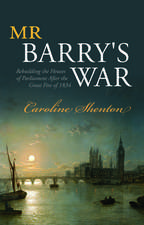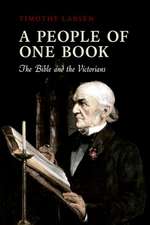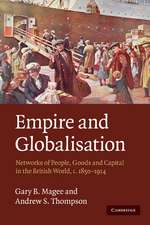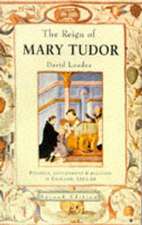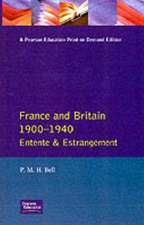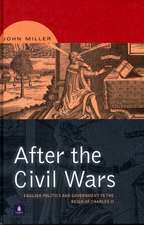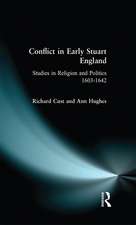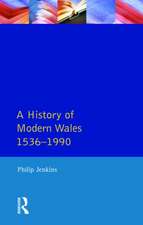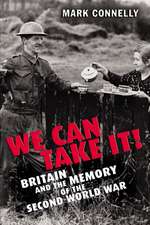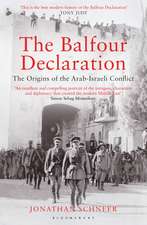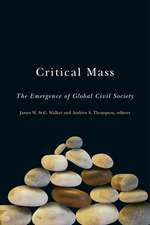Imperial Britain: The Empire in British Politics, c. 1880-1932
Autor Andrew S. Thompsonen Limba Engleză Paperback – 10 apr 2000
| Toate formatele și edițiile | Preț | Express |
|---|---|---|
| Paperback (1) | 448.86 lei 6-8 săpt. | |
| Taylor & Francis – 10 apr 2000 | 448.86 lei 6-8 săpt. | |
| Hardback (1) | 1000.27 lei 6-8 săpt. | |
| Taylor & Francis – 5 dec 2016 | 1000.27 lei 6-8 săpt. |
Preț: 448.86 lei
Nou
Puncte Express: 673
Preț estimativ în valută:
85.90€ • 93.27$ • 72.16£
85.90€ • 93.27$ • 72.16£
Carte tipărită la comandă
Livrare economică 22 aprilie-06 mai
Preluare comenzi: 021 569.72.76
Specificații
ISBN-13: 9780582319219
ISBN-10: 0582319218
Pagini: 238
Dimensiuni: 156 x 234 x 14 mm
Greutate: 0.44 kg
Ediția:1
Editura: Taylor & Francis
Colecția Routledge
Locul publicării:Oxford, United Kingdom
ISBN-10: 0582319218
Pagini: 238
Dimensiuni: 156 x 234 x 14 mm
Greutate: 0.44 kg
Ediția:1
Editura: Taylor & Francis
Colecția Routledge
Locul publicării:Oxford, United Kingdom
Public țintă
UndergraduateCuprins
Contents List of Figures, List of Tables Preface Acknowledgements Abbreviations Map Introduction 1 Imperial Languages, Identities and Beliefs Languages of imperialism Imagining empire: the idea of a British world Imperial reform Dominion nationalism and imperial integration Margins of empire: India and America Conclusion 2 Mobilising Imperialists The mainsprings of imperial politics Extra-parliamentary agitation and empire The Tariff Reform League The Navy League The Emigration Committee of the Royal Colonial Institute The political status of imperial campaigns Imperialism as a broad church Conclusion 3 Propagating Imperialism The imperialising of the British press The new journalism and the old The press and imperial agitation The Imperial Press Conference (1909) Conclusion 4 Imperial Trade: TariffReform 81 Joseph Chamberlain and the origins of tariff reform 81 The background to the campaign 83 Imperial preference and the economic unity of empire 85 The colonial perspective 90 India and imperial preference 97 Critics of preference: past and present 104 5 Imperial Security: Naval Supremacy and Defence Planning 110 Defending the Empire: the debate 110 The doctrine of sea power and the defence of empire 111 The size, distribution and composition of the Fleet 112 Colonial participation in imperial defence 119 Defence planning and the Committee of Imperial Defence 127 Conclusion 130 6 Populating the Empire: Overseas Migration 133 British overseas migration in the long nineteenth century 133 The benefits of empire migration 135 Voluntary effort versus state involvement 139 Migrant personality 141 Testing the suitability of migrants 152 Conclusion 154 7 The First World War and its Imperial Aftermath 157 The Empire at war 157 The Empire in the aftermath of the War 161 Imperialists in the Lloyd George Coalition 169 The Imperial War Cabinet and imperial foreign policy 171 The Washington naval treaty (1921-22) and the Singapore strategy 175 Tariff reform redivivus, the Empire Marketing Board, and the Empire Settlement Act 178 Conclusion 183 Conclusions 186 Biographical Appendix 196 Select Bibliography 202 Index
Descriere
This major new study considers the impact of the empire upon modern British political culture. The economic and cultural legacy of empire have received a great deal of attention, but historians have neglected the effects of empire upon the domestic British political scene. Dr Thompson explores economic, demographic, intellectual and military influences and he shows how parliamentary and party opinion interacted with imperial ideas and interests in the country at large.

